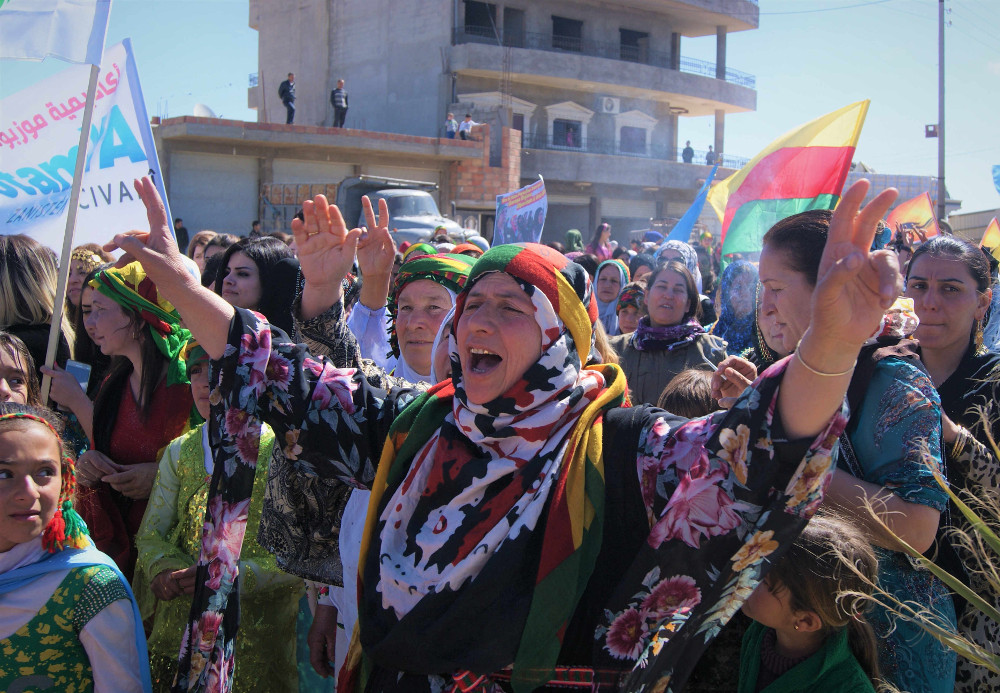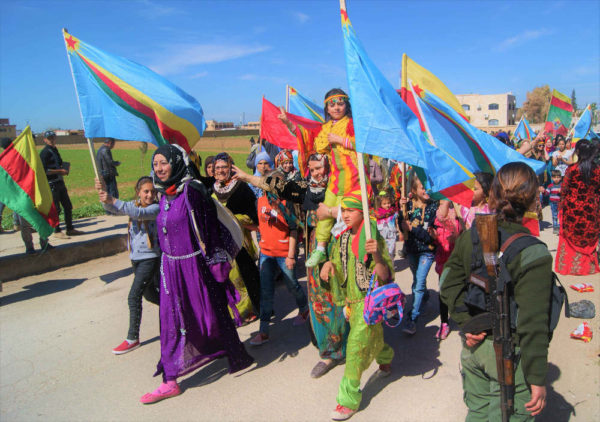
A few years ago, I began hearing remarkable stories about a social movement in northern Syria. Not far from the wreckage of Aleppo, a society founded on principles of direct democracy and women’s rights has taken root in the predominantly Kurdish region known as Rojava. There, in defiance of the Islamic State’s brutal patriarchy, women are leading the way in political decision-making and fighting on the frontlines in their own battalions.
Last year, I was invited to come to Rojava with a delegation of women from around the world—journalists, activists, academics and lawyers— in a visit set to coincide with International Women’s Day. I wanted to see for myself what was going on in Rojava, and I set about finding people to join me. Ali, a freelance journalist from Spain, and Kimmie, a university student I had interviewed for my book about hitchhiking, agreed to go. (Their last names have been left out for security reasons.) None of us had actually met in person before the trip.
The first thing we learned was that getting into Rojava was tough. Turkey had closed its borders with Syria, and the only way into Rojava was via the KRG—the semi-autonomous Kurdish region in the north of Iraq. We decided to enter the KRG from Turkey, little realizing that renewed fighting between Turkish state forces and Kurdish guerrillas had escalated so much that some of the roads were closed. In Turkey, we passed through numerous checkpoints, where security forces would interrogate and search us. When we reached the Syrian border, it took us four hours and numerous phone calls to talk our way past the final checkpoint.
Once we crossed into Rojava, we met the women from the Foundation of the Free Women of Rojava (WJAR), the organization that had invited us. It quickly became clear that, in light of the worsening security situation, even they had not expected us to make it in.
The next day—International Women’s Day—we headed to Derbesi, a village straddling the Turkey–Syria border, where a solidarity march was taking place. Thousands of Kurdish women wearing colorful traditional dresses chanted and whooped as they paraded down the street. There was a feeling of sisterhood beyond anything I’d ever felt before. Smiling women stopped to hug us, take photos, and thank us—the foreign guests—for coming. Soon we were shouting along with them: “Jin, jiyan, azadî! Jin, jiyan, azadî! Jin, jiyan, azadî!” Women, life, freedom!
We didn’t see any men at all until the end of the march, when we noticed civilian men lining the sides of the street. The women were the ones doing the marching that day—and the guarding, too. Down the street we met a female member of Rojava’s civilian self-defense force. She wore a spotless white headscarf and carried an ageing Kalashnikov rifle. Flipping a V sign, she posed for a photo.
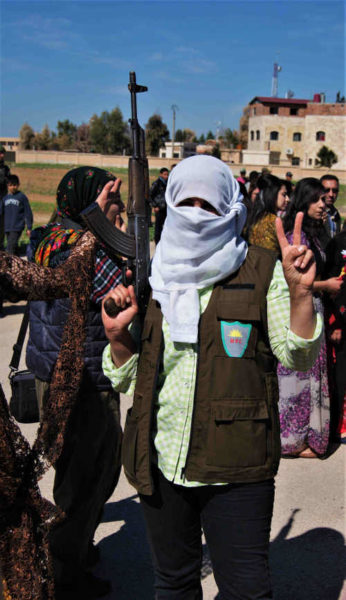
What has been happening in northern Syria has been decades in the making. Rojava, which means “west” in Kurdish, is one of four areas unofficially known as Kurdistan. In a series of treaties and agreements following World War I, the victorious European powers divvied up the lands where the Kurds lived, apportioning them across the newly created states of Turkey, Syria, and Iraq. (The northwestern part of Iran, which also has a substantial Kurdish population, is considered part of Kurdistan as well.) The Kurds encountered persecution throughout the region. In Turkey, for example, the Kurdish language was banned, with on-the-spot fines for speaking it on the street. Their names for towns, villages, mountains, and rivers were Turkified. The Turkish government even refused to acknowledge that there was such a thing as “Kurdish” people, calling them “mountain Turks” who spoke a broken form of Persian.
A half-century of repression led to the emergence of the PKK, the Kurdistan Workers’ Party, in the late 1970s. Demanding an independent Kurdish homeland, the PKK led a series of armed uprisings against the Turkish state. Tens of thousands died in the fighting over the next two decades. Under pressure from the Turkish government, the United States and other nations began listing the group as a terrorist organization.
In 1999, Abdullah Ocalan, the leader of the PKK, was captured—reportedly, with the help of the US government. He was imprisoned in the Turkish island prison of Imrali, where he has remained ever since. During the first years of his incarceration, Ocalan’s politics underwent a dramatic shift. Originally a proponent of Marxist-Leninist communism, he turned to a form of communalism he called “democratic confederalism.” Inspired by the writings of social ecologist Murray Bookchin, democratic confederalism sees the nation-state itself as a fundamental cause of social problems.
If the Kurds went down the conventional path of nationhood, Ocalan argued, they would eventually fall into the same trap of authoritarianism that had snared their oppressors. Influenced by his ideas, the PKK in Turkey eventually abandoned its struggle for an independent nation. It instead began working to develop a “bottom-up” democracy built upon neighborhood councils and rotating elected representatives, with quotas for women and ethnic and religious minorities. This model of self-governance quickly spread across the borders of Turkey to other parts of Kurdistan, including Rojava.
When the Syrian civil war broke out, the country’s president, Bashar al-Assad, was forced to loosen his grip on the north and send his army to fight rebel forces elsewhere. Rojava’s geography was not ideal for staging a revolution, with a hostile Turkey to the north, land controlled by the Islamic State to the south, and a river border with war-torn Iraq to the east. Nevertheless, the Kurds in Rojava seized the opportunity to revolt against Assad’s regime. In 2012, the region declared its autonomy.
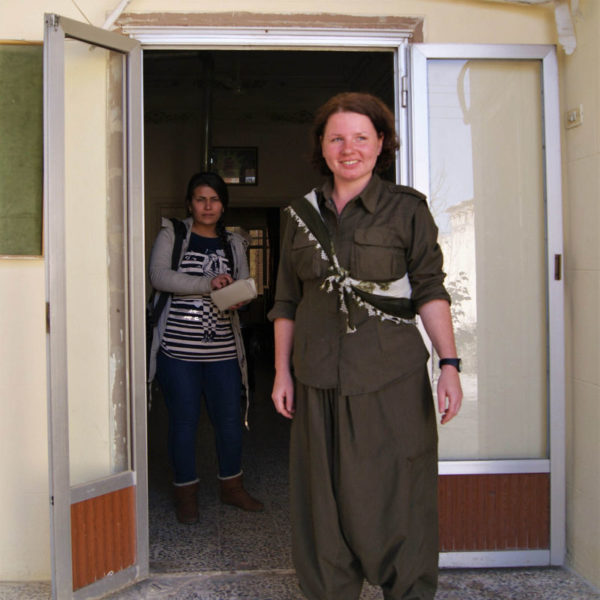
On the third day of our trip, we traveled to Serekaniye, one of the region’s largest cities, where we visited a health clinic run by WJAR, a key player in the women’s movement in Rojava. A group of women wearing black chadors arrived shortly afterward, accompanied by several young children. I recognized the center’s coordinator from the march. Originally from Holland, she went by the Kurdish name Ronahi (for security reasons, Westerners who come to Rojava to help the movement are given Kurdish names). We watched her at work, switching easily between Kurdish, Arabic, Turkish, and English as she talked to us, our interpreter, her staff, and the veiled women. She told us that people would walk for hours from the outlying villages to reach the women’s clinic.
Later, Ronahi took us through a local park and over some conspicuous mounds of earth to a simple building. It was a barracks for the YPJ—a women’s fighting force that is part of Rojava’s army. The women there had been fighting on the frontlines against the Islamic State. The mounds in front of the barracks, I learned, had been put outside to stop car bombs from driving in.
Inside, we were greeted by several young women who smiled shyly and invited us to sit. A woman with hair hanging down past her waist brought over a tray of teacups and sugar; another followed with a teapot. Ronahi, translating for us, asked them for permission to record our conversation. Two of the women declined—they said they had family in Turkey who could be at risk if their identity were uncovered—so we agreed to record only Ronahi’s English translation.
During the course of the next two hours, it became clear that the women, who called one another sisters, had developed the tightest of bonds. “We are one soul,” one soldier told us. I was also interested to learn that one of the women in their unit was Arab, not Kurdish. The YPJ soldiers told us war stories about the Islamic State. I was particularly struck by their claim that they would routinely find amphetamines on the bodies of the fighters they killed. “One time a man was so high on drugs, he wandered right into the frontline. He didn’t seem to know even where he was,” one woman told us, shaking her head slowly.
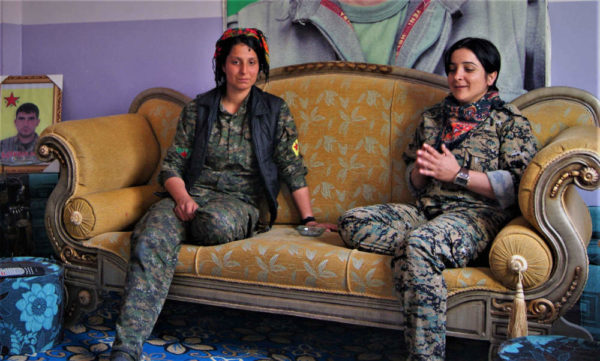
The leaders of the women’s movement in Rojava don’t call what they are doing “feminism.” They say they are simply reclaiming a lost “heritage”—a tradition of women’s empowerment that was lost centuries ago. Later, when I began reading Ocalan’s writings on gender, I recognized that these were his ideas. The advent of monotheistic religions had made goddess worship sacrilegious and turned women into slaves within the household, Ocalan argued. Capitalism had brought this oppression and objectification to another level. What was necessary for society to be free, he concluded, was an end to patriarchal power and violence—a movement to “kill the dominant male” (figuratively speaking)—and the establishment of independent political institutions of, for, and by women.
After Rojava broke away from Syrian rule, the movement mandated that at least 40 percent of representatives on its councils and committees be women. It set similar quotas for Arabs and Christians and established a number of women-only spaces and organizations, such as mala jin, or “women’s houses,” where women could go for help with issues relating to domestic abuse, forced and underage marriages, and polygamy—all practices that had been outlawed after the start of the revolution in 2012.
A representative at a women’s house we visited in Qamishlo, Rojava’s de facto capital, told us that the day before a woman had come in after being beaten by her father over a trivial matter: the unexplained presence of a dog in their family’s garden. “The father got angry and asked why was this dog there. And then he got more angry and hit her.” The women at the center decided to put the father in jail. “Of course we don’t want everyone put in jail,” the representative told us. “But sometimes you have seen the body—everything is blue. So he should sit there for some days to come back to his mind and realize that it’s not right to hit her.”
Although the Assad regime’s prisons are still in use in Rojava, they now house captured Islamic State fighters for the most part. The way the courts operate has changed, too. In Qamishlo, for instance, those arrested for crimes no longer go before a government judge, but instead face a panel of people from the community, who as a group decide on a fitting punishment—one that, in line with Rojava’s new principles, often does not involve jail time.
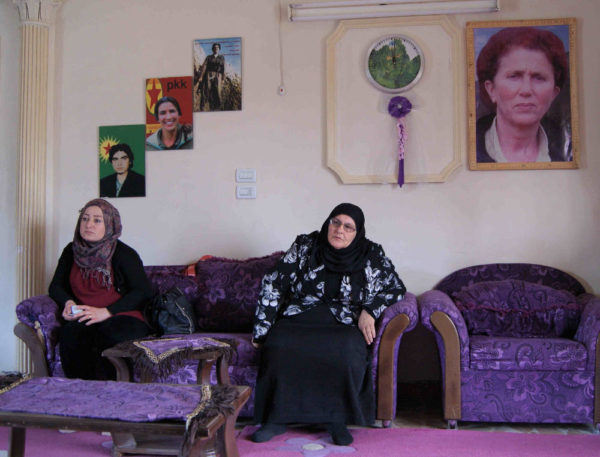
From my conversations with representatives of the Rojava movement, it seems that they see education as a particularly important strategy for women’s empowerment. In recent years, WJAR has opened a number of preschools in the region, with the aim of having a preschool and a health clinic in every neighborhood in every city. We visited Akademya Star, a women’s academy open to all regardless of age or ethnic background. Classes there are based on discussions and debates rather than lectures, and the topics covered include women’s history. “When you understand the system,” a representative from the academy told us, “you have the power to change it.”
Later, we met a Kurdish woman from Turkey named Nahide Zengin, who was working to set up the Greenhouse Project, an agricultural cooperative run by women from eighteen communes. Zengin said that the collective planned to grow fruit and vegetables without the use of chemicals. For several decades, the Assad regime used the whole of Jazira—Rojava’s largest canton—and most of the Kobani canton for pesticide-heavy wheat production. Other than for a few large private landholdings, the fields were state-owned. Most of the farmworkers were paid meager wages. Over the years, the trees in those areas were cut down, and their soil depleted.
Now cooperatives like the Greenhouse Project are trying to recover some of the local knowledge about small-scale, sustainable farming that has been lost over the years. Zengin said that their focus was on something more than just producing as much food as they possibly could. There was a social and political element to their work, too. Rojava aims to develop what the movement calls a “social economy,” with 80 percent of its economy based on the goods and services of cooperatives. “If we don’t give this to the society, then we’re going to be just like a company,” said Zengin, who lived in England for eleven years before coming to Rojava. “Then we’re not working for Rojava—we’re working for ourselves.”
Zengin told us that in England she had had her own company, a house, and a car. Unhappy with that life, she had given it all up to come to Rojava, she said. “I get up early, and … everything is very clear. Dirt, war—no problem,” she said. “Sometimes people think about where they are going to die. Well, I chose my place.”
In the greenhouses we saw little green shoots peeping out from rows of pots. Months after I left Rojava, I would see photos of the cooperative’s women showing off huge piles of the melons and courgettes they had grown.
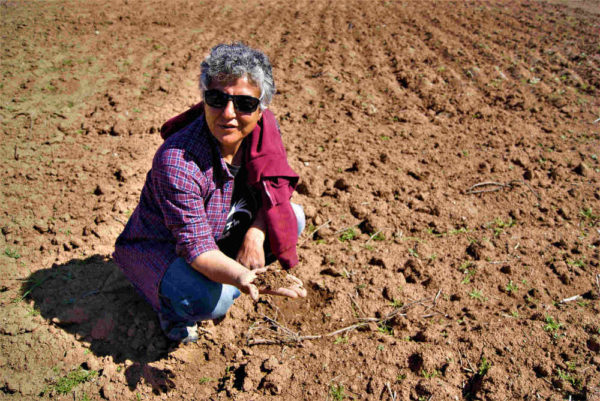
Near the end of our trip, we visited a Yezidi refugee camp run by the movement. The Yezidi are ethnic Kurds who practise an ancient pre-Islamic religion related to Zoroastrianism. The Islamic State considers them the worst kind of infidels. The people in the camp, I learned, were the survivors of the 2014 massacre on Mount Sinjar in northern Iraq.
The United Nations has been providing the refugee camp with some supplies, but it cannot have an official presence there, the camp’s coordinator told us, given that nominally the Syrian regime controls the territory under international law. WJAR is running a health clinic there and organizing clothes-making workshops for the camp’s women. It has also established a school for children—many of whom, the coordinator noted, were dealing with trauma from the Sinjar massacre.
As we were driving away from the refugee camp, our guide told us that a friend of hers—a veteran fighter in the women’s army—had been among the first Kurdish forces to arrive in Sinjar and engage the Islamic State in combat. By the time they were able to rescue the Yezidi, however, thousands of them had already been beheaded, disemboweled, crucified, raped, and sold into sex slavery. Her friend, our guide said, is still traumatized by what she saw there.
Shortly before we left Rojava, Kimmie told us she was staying behind. Before our trip, she had planned to spend the next few years finishing her university degree and then starting her own NGO. But the experiences of the last two weeks had convinced her that Rojava was where she was really needed.
The day before Newroz, the Kurdish New Year, we exchanged an emotional goodbye at the border. Then Ali and I took a small boat back across the river to Iraq—the day before the border closed. Since then it has opened at times for a small amount of trade—five trucks per day being the last news I heard—but is often completely sealed.
In the year since I was in Syria, the Islamic State has suffered major losses on the battlefield. The ongoing sieges of Mosul in Iraq and Raqqa in Syria by coalition forces—often led by Kurdish fighters—offer hope that the extremist group is on the verge of defeat. In Rojava, however, the situation is uncertain. Determined to stamp out a possible Kurdish state, Turkey invaded Syrian territory last August and began shelling Kurdish positions, while at the same time continuing to wage war against its own Kurdish population. In their mission to wipe out the PKK, Turkish troops have razed parts of many cities (such as the predominantly Kurdish city of Cizre), displaced hundreds of thousands of civilians, and allegedly committed war crimes.
I am still in regular contact with people in Rojava, and they tell me that the women’s movement, despite the danger, continues to thrive. Meanwhile, the idea of democratic confederalism is spreading beyond Kurdistan. As Kurdish-led forces retake more territory in Syria, some of the newly liberated cities and villages are setting up their own councils and communes. When the Islamic State and Turkey’s authoritarian regime fall—as all such oppressive states eventually do—women will rebuild their communities.
Jo Magpie Jo Magpie is a freelance journalist, travel writer, and long-term wanderer currently based in Granada, Spain. Blog: agirlandherthumb.wordpress.com
- Follow us on Twitter: @inthefray
- Comment on stories or like us on Facebook
- Subscribe to our free email newsletter
- Send us your writing, photography, or artwork
- Republish our Creative Commons-licensed content

